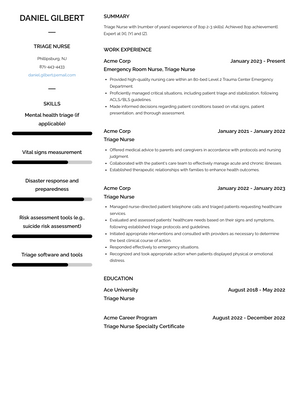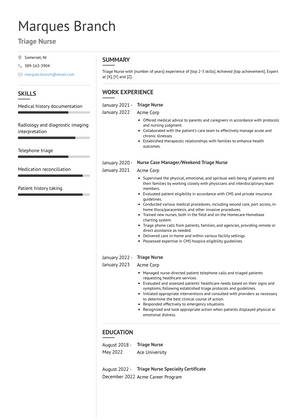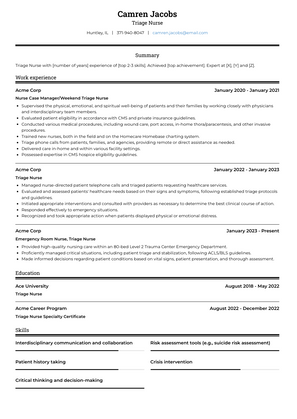Triage Nurse Resume Examples and Templates
This page provides you with Triage Nurse resume samples to use to create your own resume with our easy-to-use resume builder. Below you'll find our how-to section that will guide you through each section of a Triage Nurse resume.



What do Hiring Managers look for in a Triage Nurse Resume
- Clinical Expertise: Strong knowledge of medical conditions, assessment skills, and the ability to triage patients based on severity.
- Communication Skills: Effective communication with patients, caregivers, and medical staff to gather information and provide guidance.
- Decision-Making Abilities: Capability to make quick and accurate decisions on patient care and prioritization.
- Compassion and Empathy: Compassionate care for patients in distress, demonstrating empathy and understanding.
- Adaptability: Ability to work in a fast-paced environment and adapt to changing patient needs and medical situations.
How to Write a Triage Nurse Resume?
To write a professional Triage Nurse resume, follow these steps:
- Select the right Triage Nurse resume template.
- Write a professional summary at the top explaining your Triage Nurse’s experience and achievements.
- Follow the STAR method while writing your Triage Nurse resume’s work experience. Show what you were responsible for and what you achieved as a Triage Nurse.
- List your top Triage Nurse skills in a separate skills section.
Advance your nursing career with a professionally written resume. Our nurse resume writing service highlights your clinical expertise, patient care skills, and healthcare accomplishments to help you secure your ideal nursing role.
Also, checkout our medical resume templates that are loved by thousands of medical professionals.
How to Format a Triage Nurse Resume?
To format your Triage Nurse Resume:
- You can create a resume from scratch, use a resume builder, or use a Google doc resume templates or Word resume template.
- Make sure to select the right resume layout. You can pick from reverse chronological format, combination resume format or a functional resume format.
- Include some or all of these sections within your resume: resume header, summary or objective, resume experience, skills, certifications, education, portfolio, interests, achievements, references, or your publications.
- Make sure that you have an ATS friendly resume template. Your resume can look good, but you are likely to be filtered through an ATS system.
- You can take feedback from friends/family/colleagues, use an AI resume builder, or even use a professional resume formatting or review service if you are unsure.
- If you are still unsatisfied with your resume’s formatting, consider a professional resume writing service.
How to Write Your Triage Nurse Resume Header?
Write the perfect Triage Nurse resume header by:
- Adding your full name at the top of the header.
- Add a photo to your resume if you are applying for jobs outside of the US. For applying to jobs within the US, avoid adding photo to your resume header.
- Add your current Triage Nurse position to the header to show relevance.
- Add your current city, your phone number and a professional email address.
- Finally, add a link to your portfolio to the Triage Nurse resume header. If there’s no portfolio link to add, consider adding a link to your LinkedIn profile instead.
Bad Triage Nurse Resume Example - Header Section
Marianna 35 Marshall Drive Chardon, OH 44024 Marital Status: Married, email: cooldude2022@gmail.com
Good Triage Nurse Resume Example - Header Section
Marianna Hickman, Chardon, OH, Phone number: +1-555-555-5555, Link: linkedin/in/johndoe
Make sure to add a professional looking email address while writing your resume header. Let’s assume your name is John Doe - here is a formula you can use to create email addresses:
- firstnamelastname@email.com - johndoe@email.com
- firstname.lastname@email.com - john.doe@email.com
- lastname.firstname@email.com - doe.john@email.com
- f.lastname@email.com - j.doe@email.com
- l.firstname@email.com - d.john@email.com
- firstnamelastname12@email.com - johndoe12@email.com
For a Triage Nurse email, we recommend you either go with a custom domain name (john@johndoe.com) or select a very reputed email provider (Gmail or Outlook).
How to Write a Professional Triage Nurse Resume Summary?
Use this template to write the best Triage Nurse resume summary: Triage Nurse with [number of years] experience of [top 2-3 skills]. Achieved [top achievement]. Expert at [X], [Y] and [Z].
How to Write a Triage Nurse Resume Experience Section?
Here’s how you can write a job winning Triage Nurse resume experience section:
- Write your Triage Nurse work experience in a reverse chronological order.
- Use bullets instead of paragraphs to explain your Triage Nurse work experience.
- While describing your work experience focus on highlighting what you did and the impact you made (you can use numbers to describe your success as a Triage Nurse).
- Use action verbs in your bullet points.
Emergency Room Nurse, Triage Nurse Resume Example
Emergency Room Nurse, Triage Nurse
- Provided high-quality nursing care within an 80-bed Level 2 Trauma Center Emergency Department.
- Proficiently managed critical situations, including patient triage and stabilization, following ACLS/BLS guidelines.
- Made informed decisions regarding patient conditions based on vital signs, patient presentation, and thorough assessment.
Triage Nurse Resume Example
Triage Nurse
- Managed nurse-directed patient telephone calls and triaged patients requesting healthcare services.
- Evaluated and assessed patients' healthcare needs based on their signs and symptoms, following established triage protocols and guidelines.
- Initiated appropriate interventions and consulted with providers as necessary to determine the best clinical course of action.
- Responded effectively to emergency situations.
- Recognized and took appropriate action when patients displayed physical or emotional distress.
Triage Nurse Resume Example
Triage Nurse
- Offered medical advice to parents and caregivers in accordance with protocols and nursing judgment.
- Collaborated with the patient's care team to effectively manage acute and chronic illnesses.
- Established therapeutic relationships with families to enhance health outcomes.
Nurse Case Manager/Weekend Triage Nurse Resume Example
Nurse Case Manager/Weekend Triage Nurse
- Supervised the physical, emotional, and spiritual well-being of patients and their families by working closely with physicians and interdisciplinary team members.
- Evaluated patient eligibility in accordance with CMS and private insurance guidelines.
- Conducted various medical procedures, including wound care, port access, in-home thora/paracentesis, and other invasive procedures.
- Trained new nurses, both in the field and on the Homecare Homebase charting system.
- Triage phone calls from patients, families, and agencies, providing remote or direct assistance as needed.
- Delivered care in-home and within various facility settings.
- Possessed expertise in CMS hospice eligibility guidelines.
Top Triage Nurse Resume Skills for 2023
- Medical assessment and triage
- Patient history taking
- Vital signs measurement
- Pain assessment
- Nursing diagnosis
- EHR (Electronic Health Record) systems
- Medication administration
- Intravenous (IV) therapy
- Wound assessment and care
- CPR (Cardiopulmonary Resuscitation)
- Emergency response protocols
- Advanced cardiac life support (ACLS)
- Pediatric Advanced Life Support (PALS)
- Obstetric triage (if applicable)
- Trauma assessment and management
- Radiology and diagnostic imaging interpretation
- Laboratory test interpretation
- Infection control and prevention
- Emergency medical procedures
- EKG (Electrocardiogram) interpretation
- Nursing documentation
- Patient education and counseling
- Telephone triage
- Medical history documentation
- Triage software and tools
- Emergency room protocols
- Pain management techniques
- Medication reconciliation
- Emergency response equipment operation
- Rapid assessment skills
- Critical thinking and decision-making
- Crisis intervention
- Disaster response and preparedness
- Informed consent processes
- Legal and ethical considerations in triage
- Cultural competency in healthcare
- Telehealth and telemedicine triage
- Pediatric assessment and care
- Geriatric assessment and care
- OB-GYN assessment and care (if applicable)
- Mental health triage (if applicable)
- Substance abuse assessment (if applicable)
- Domestic violence assessment (if applicable)
- Community resources referral
- HIPAA (Health Insurance Portability and Accountability Act) compliance
- Risk assessment tools (e.g., suicide risk assessment)
- Crisis hotline and helpline procedures
- Nursing continuing education and certification
- Interdisciplinary communication and collaboration
- Patient advocacy
How Long Should my Triage Nurse Resume be?
Your Triage Nurse resume length should be less than one or two pages maximum. Unless you have more than 25 years of experience, any resume that’s more than two pages would appear to be too long and risk getting rejected.
On an average, for Triage Nurse, we see most resumes have a length of 2. And, that’s why we advise you to keep the resume length appropriate to not get rejected.
How can I highlight my triage experience on a Triage Nurse resume?
To highlight your triage experience, focus on your ability to assess patient conditions quickly and accurately, prioritize care based on urgency, and make critical decisions under pressure. Include specific examples of situations where your triage skills directly impacted patient outcomes, such as effectively managing high patient volumes or identifying life-threatening conditions early.
What are the key skills to feature on a Triage Nurse resume?
Key skills to feature include patient assessment, critical thinking, emergency care, and strong communication. Additionally, highlight your proficiency with electronic health records (EHR), your ability to work in high-pressure environments, and your knowledge of triage protocols such as the Emergency Severity Index (ESI). Emphasize your ability to make quick, informed decisions and your experience in coordinating care with other healthcare professionals.
How do I demonstrate my ability to prioritize care on a Triage Nurse resume?
Demonstrate your ability to prioritize care by providing examples of how you’ve assessed patient conditions, determined the severity of their symptoms, and allocated resources accordingly. Mention any experience you have in using standardized triage tools or systems to classify patients and ensure those with the most critical needs receive immediate attention. Highlight your ability to manage multiple patients simultaneously while maintaining high standards of care.
Should I include metrics on my Triage Nurse resume? If so, what kind?
Including metrics can help quantify your impact as a Triage Nurse. For example, you could mention the average number of patients you triage per shift, your accuracy rate in identifying critical cases, or the reduction in wait times due to your efficient triage practices. Metrics provide tangible evidence of your effectiveness in managing patient flow and ensuring timely care.
How can I showcase my experience with emergency care on my resume?
You can showcase your experience with emergency care by detailing your role in managing acute conditions, stabilizing patients, and coordinating with emergency medical services (EMS). Mention any experience you have in handling life-threatening situations, such as cardiac arrests, strokes, or trauma cases. Highlight your ability to remain calm under pressure, administer appropriate interventions, and collaborate with emergency room teams to ensure seamless patient care.
What kind of achievements should I highlight as a Triage Nurse?
Highlight achievements such as successfully reducing patient wait times, improving triage accuracy, or implementing new protocols that enhanced patient care. You could also mention any recognition you received for your performance, such as awards, commendations, or positive feedback from patients or colleagues. Achievements that demonstrate your commitment to patient safety and efficient care delivery are particularly valuable.
How do I address a lack of experience on a Triage Nurse resume?
If you lack specific triage experience, focus on transferable skills such as patient assessment, critical thinking, and your ability to work in fast-paced environments. Mention any relevant internships, clinical rotations, or volunteer work where you gained experience in assessing patients and making care decisions. Emphasize your eagerness to develop your triage skills, your understanding of triage protocols, and any relevant certifications or training you’ve completed.
How important is experience with electronic health records (EHR) for a Triage Nurse?
Experience with electronic health records (EHR) is very important for a Triage Nurse, as it involves accurately documenting patient information and communicating with the healthcare team. Highlight your proficiency in using EHR systems to record triage assessments, update patient statuses, and coordinate care. Mention any specific EHR platforms you’ve worked with, such as Epic, Cerner, or Meditech.
How do I demonstrate my ability to handle high-stress situations on my resume?
Demonstrate your ability to handle high-stress situations by describing instances where you successfully managed a large influx of patients, made quick decisions in critical situations, or handled multiple emergencies simultaneously. Mention your approach to staying organized, prioritizing tasks, and maintaining a calm and professional demeanor even in the most challenging circumstances. Highlight any experience you have in leading or coordinating during high-pressure situations.
Should I include certifications on my Triage Nurse resume?
Yes, including certifications is important as they demonstrate your expertise and commitment to professional development. Certifications such as Basic Life Support (BLS), Advanced Cardiovascular Life Support (ACLS), Pediatric Advanced Life Support (PALS), and any specific triage certifications or emergency nursing certifications (like Certified Emergency Nurse, CEN) can add significant value to your resume and make you stand out to potential employers.
-
How can I highlight my triage experience on a Triage Nurse resume?
-
What are the key skills to feature on a Triage Nurse resume?
-
How do I demonstrate my ability to prioritize care on a Triage Nurse resume?
-
Should I include metrics on my Triage Nurse resume? If so, what kind?
-
How can I showcase my experience with emergency care on my resume?
-
What kind of achievements should I highlight as a Triage Nurse?
-
How do I address a lack of experience on a Triage Nurse resume?
-
How important is experience with electronic health records (EHR) for a Triage Nurse?
-
How do I demonstrate my ability to handle high-stress situations on my resume?
Copyright ©2025 Workstory Inc.
